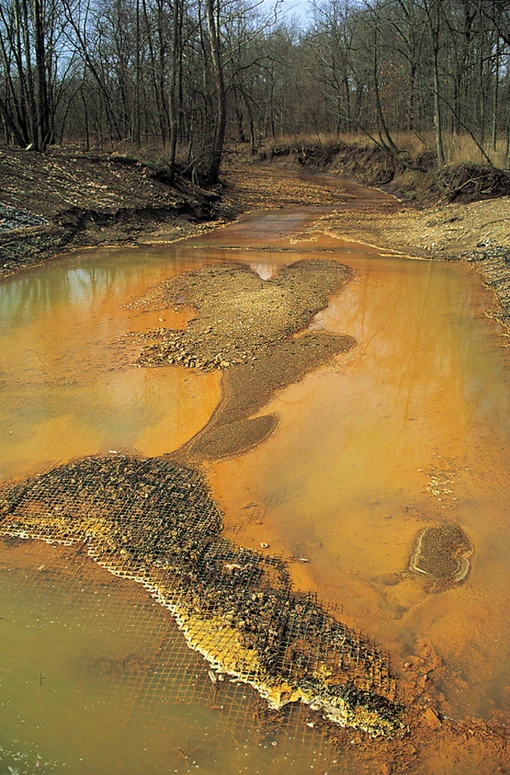Heavy Metal Contamination & Leaching
Heavy metal contamination and leaching occurs when the metals contained in excavated rock or exposed in an underground mine come in contact with water. Metals are leached out and carried downstream as water washes over the rock surface. Although metals can become mobile in neutral pH conditions, leaching is particularly accelerated in the low pH conditions such as are created by acid mine drainage.
Metals and the Environment
Depending on geological factors, the metals found in mining waste may include arsenic, cobalt, copper, cadmium, mercury, aluminium, chromium, gold, iron, lead, silver, zinc, molybdenum, antimony.
Metals are essential to life in trace amounts. In higher concentrations, however, they can be highly toxic and fatal.
Carried in water, the metals can travel far, contaminating streams and groundwater for great distances.


When metals are in a dissolved form they are more readily absorbed and accumulated by plant and animal life, and therefore generally more toxic than when they are in solid form.
Even in very small amounts, metals can be toxic to humans and wildlife.
The impacts to aquatic life may range from immediate fish kills to sublethal, impacts affecting growth, behaviour or the ability to reproduce. Because the transfer or “uptake” of metals can occur to animal tissues and plants, they can be passed along to other living things in the food chain.
Yellow Boy
Weathering products of the oxidation of heavy metals (especialy the iron) form a red/orange colored precipitate, commonly called “yellow boy”. It can be found in thousands of miles of streams affected by AMD.
These compounds may physically coat the surface of stream sediments and streambeds destroying habitat, diminishing availability of clean gravels used for spawning, and reducing fish food items.

Resources for this article:
ProtectEcuador.org does not own any rights over the content of this page. This article is intended for educational purposes and it is a compendium of information already existing on the internet.
team of experts at the Environmental Law Alliance Worldwide (ELAW) (2010). “Guidebook for Evaluating Mining Project EIAs“
BC Wild, Environmental Mining Council of BC (2006). “Acid Mine Drainage: Mining and Water Pollution Issues“
Jeff Skousen, Tiff Hilton, and Ben Faulkner. Overview of Acid Mine Drainage Treatment with Chemicals
Kappes, Cassiday & Associates. “Precious Metal Heap Leach Design and Practice“
Jennings, S.R., Neuman, D.R. and Blicker, P.S. (2008). “Acid Mine Drainage and Effects on Fish Health and Ecology: A Review“. Reclamation Research Group Publication, Bozeman, MT.
Wikipedia.org – Acid Mine Drainage

